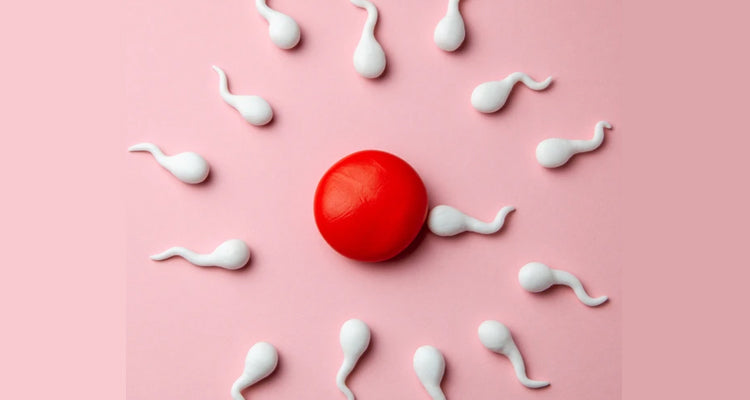Many of us have been, will be or are currently dealing with the difficulty of fertility issues. Fertility issues affect around 1 in 6 couples in Ireland and can be an extremely emotional and stressful experience. This is a topic that many people often shy away from as there is still a level of taboo associated with it. At Meaghers, we want to help lift the lid on this topic and our fertility expert Amy has put together this incredibly informative blog discussing the causes of infertility, some ways to boost your fertility and the options available to help through lifestyle changes and supplementation.
Some Causes of Infertility
Ovulation
The lack of regular ovulation and poor egg quality are very common causes of infertility. They are caused by hormonal imbalance and are sometimes related to age, stress, weight and Polycystic Ovarian Syndrome (PCOS), a condition that effects 1 in 5 women. The hormonal imbalance that causes PCOS often means that ovulation is irregular and may not even occur. However, most women with PCOS are able to get pregnant with careful treatment.
Endometriosis
The endometrium is the lining of the womb. During a woman’s monthly cycle the endometrium builds up and becomes thick and enriched so it's ready to receive a fertilized egg (driven by hormone levels). If conception doesn’t take place, this lining sheds as a period. Endometriosis is a condition where these endometrial cells build up outside the uterus. This tissue has no outlet from the body and can build up, forming cysts on the ovaries, causing inflammation and scaring or damaging the tissue of the uterus. Many women don’t suffer any symptoms from endometriosis but some have painful periods and can suffer pain during intercourse.
Fallopian Tubes
The fallopian tubes carry the egg from the ovaries to the uterus and they are where fertilization of the egg by the sperm occurs. These may be damaged or blocked, thus preventing the egg from meeting the sperm. This can occur after inflammation of the pelvis. This inflammation can be as a result of infection, pelvic inflammatory disease, appendicitis, endometriosis or surgery. It is thought that blockage of the fallopian tubes accounts for up to a quarter of all cases of infertility.
Sperm
Most problems of male infertility are associated with sperm. A low sperm count means that a man does not produce enough sperm. The sperm also may not be of a good enough quality. Sperm need to be strong as they need to be able to reach the fallopian tubes where fertilization occurs. Sometimes sperm aren’t motile, meaning they can’t ‘swim’ properly, or they may have an unusual shape which will affect fertility. Other causes of male infertility might be related to problems with the tubes carrying the sperm, erectile dysfunction or damage to the testicles.
Miscarriage
Losing a baby can be heart-breaking but unfortunately it is common. In the first 12 weeks of pregnancy miscarriage is usually caused by an abnormality in the embryo. After 12 weeks miscarriage is more often related to problems with the uterus, cervix or pelvis. A person can be prone to miscarriage and there is sometimes an immunological factor associated with this, where the embryo may not be implanting properly or where the woman’s immune system doesn’t recognise the embryo and attacks it. Treatments for some types of this immune dysfunction are available.
Age
Age per se is not a cause of infertility, but it is a contributing factor. Women are most fertile when they’re in their early 20s. When women are 35, they are only half as fertile as when they were 25 and when they’re 40, they are half as fertile as when they were 35. Women are born with their lifetime supply if eggs. These eggs are immature and each month a number of them start to mature but only a small amount do this successfully and the other eggs are lost, thus the ‘bank’ of eggs a woman carries diminishes over time. Also, these eggs age, making them less likely to mature properly, less capable of fertilisation and implantation of the embryo doesn’t occur as readily. In addition, the risk of miscarriage increases with age and there is a higher occurrence of congenital abnormalities. Men’s fertility reduces too, but to a lesser extent usually associated with aging sperm and reduced frequency of intercourse.
How to Boost Fertility
Healthy Lifestyle
When it comes to boosting your fertility, the basic strategy is to be as healthy as possible! Make sure to have a balanced, healthy diet as this will give the body the nutrients to conceive and nourish a growing baby. This also helps the cells in the body to develop into mature functioning cells keeping processes like sperm production at their optimum levels. A diet including lots of fruit and vegetables, carbohydrates such as wholemeal bread and pasta, lean meat and fish, and vegetable based proteins like beans and lentils is recommended. Keeping foods that are high in sugar, fats or that are highly processed to a minimum would be advised.
Be good to your body – stop smoking, avoid alcohol, exercise regularly and avoid toxins.
- Smoking affects reproductive health, causing hormonal problems linked to early menopause, infertility and sperm production. It can cause babies to be premature or have a low birth weight.
- Drinking alcohol can affect fertility, lower the quality of sperm and can contribute to miscarriage.
- Regular exercise reduces stress and helps maintain weight and fitness.
- Some solvents and pesticides are known to lower sperm counts so be very careful when handling paints, lacquers, inks, adhesives and other solvents.
Weight
Weight is important when it comes to fertility; being overweight or underweight may affect ovulation and contribute to hormonal imbalance. Men who are overweight have lower rates of sperm motility and can suffer from erectile dysfunction. It can be a difficult and slow process to lose weight, but it’s important to eat healthily as a starving body isn’t likely to support a pregnancy. As well as keeping to a healthy diet, it is recommended to exercise for 30 minutes a day three or four days per week.
Managing Stress
It is known that stress can have a negative impact on the body and brain and having fertility problems can be an emotional and stressful experience. This stress and the stresses of daily life can put a strain on relationships, lower libido, reduce the ability to conceive and reduce the quality of sperm. It is probably not possible to remove this stress completely but it can be reduced by relaxing, giving yourself time to chill out, have a bath, be alone, perhaps having a spa break or weekend away. Talking to your partner, GP or using a counselling service and being open about your fears can help too – it is not something you have to go through alone.
Nutrition
There is no doubt that nutrition is one of the cornerstones of fertility. A good diet gives your body the nutrients, vitamins and minerals needed to produce healthy sperm, develop healthy eggs, prepare the body for pregnancy and nurture a growing baby. Recently there has been a lot of focus on studying nutrition in relation to fertility and most of this research suggests that following a Mediterranean diet can optimise fertility.
Antioxidants
Mediterranean diets tend to be rich in whole grains, fruit and vegetables and healthy fats. One of the most important elements of this diet is its high antioxidant content. An antioxidant is a powerful substance that combats harmful chemicals called free radicals and can reduce inflammation. Free radicals are unstable and they harm cells by damaging their DNA and causing the cells to age prematurely. They are damaging to all cells but egg and sperm cells are particularly vulnerable.
You’ll find antioxidants in many foods but the best source are brightly coloured fruit and vegetables such as blueberries, raspberries, spinach, bell peppers, beetroot, sweet potato and carrots. If you are worried that your diet doesn’t contain enough of these antioxidants and are thinking of taking an additional supplement these are the ones to look out for:
- Vitamin E
- Selenium
- Copper
- Vitamin C
- L-Carnitine
- Alpha Lipoic Acid (ALA)
It’s good to note though that our bodies can find it hard to absorb antioxidants so it’s important to give the body the means to make them itself. These are some building blocks for antioxidants:
- N-Acetylcysteine (NAC)
- Glutamine and Glycine
- Iron
Food that naturally contain these nutrients are broccoli, avocado, spinach, chicken, yogurt, eggs, tuna, lentils, sunflower seeds and oats. In terms of available supplements, My Fertiltiy Box is jam packed with these antioxidants which help prevent the premature aging of all our cells and help our body produce more egg and sperm cells that function better.
Good Fats
The fats we’re talking about here are the healthy unsaturated fats often contained in seafood and some plants, in particular omega 3 fatty acids. Omega 3 oils are essential for the production of sex hormones, they can help prevent blood clotting and aid foetal development. Good sources of omega 3s include oily fish (salmon, mackerel, sardines, mussels, trout, oysters), nuts and seeds, avocados and unrefined oils (olive oil, flaxseed oil). Our bodies don’t make omega 3 fats, so we have to depend on getting them from our diets. Its recommended that women have two portions of oily fish per week and that men have four portions. If you don’t like fish or find it hard to consume the recommended amounts of omega 3s you can take a supplement to compliment this.
Omega 3s are also important for our immune system and can enhance the function of some of our immune cells boosting our immune system’s ability to fight infections. It’s unusual for a supplement to contain Omega 3s – they are usually sold separately, however My Fertility Box contains a very good quality Omega 3 that will help boost our immune system, helps increase blood flow and therefore allows all the good nutrients in My Fertility Box to be brought to where they’re needed in the body. The Omega 3s are good at regulating our hormones and seem to be beneficial at reducing stress and boosting brain function.
Energy Production
Nutrition and energy go hand in hand. What we eat provides us with the energy to go about our daily lives. Carbohydrates, fats and proteins are the main sources of energy in our diets. We need energy but we have to keep the balance right as excess energy intake can affect our fertility and cause heart disease, obesity and other chronic conditions. A Mediterranean diet is full of all the good sources of energy such as wholemeal bread and pasta, lean meat and fish, eggs and pulses that will optimise our energy levels, aid egg and sperm production and improve our overall health.
As well as carbohydrates a number of other nutrients can help aid energy production and thus provide our cells with the energy they need to work optimally. These nutrients include:
- Coenzyme Q10
- B Vitamins
- Iron
- Biotin - MSM
- Copper
- Iodine
- Coenzyme Q10 (CoQ10) is only found in small amounts in our diets in peanuts, sardines and organ meats like kidney. Our bodies are hugely dependent on CoQ10. Mitochondria are parts of every cell in our bodies. They are known as the ‘power houses’ of our cells. They basically produce and release the energy that cell needs to function and CoQ10 is the fuel that the mitochondria use to produce that energy. It is hugely important for our brains, heart, liver and reproductive organs. Female eggs depend almost exclusively on CoQ10 for their energy. Our bodies production of CoQ10 peaks around the age of 21. CoQ10 is also an antioxidant.
If our cells can use energy more effectively they will be more productive and function better. The high levels of CoQ10 in My Fertility Box combined with the other ingredients listed above such as Vitamins B1, B3, B5 and B12 will provide our cells with this energy and help us use the energy more efficiently, producing healthier egg and sperm cells. In addition, more energy will help support the development of the endometrium and hopefully a baby too.
Immune Support
We mentioned briefly that there may be a link between fertility and the immune system so it’s really important that what we eat nurtures this system. Our immune system isn’t only working when we are ill, but it’s continuously working in the background to help keep our bodies in the best condition possible.
- Vitamin D (The Sunshine Vitamin) has a number of roles in our bodies. Its main role is to absorb calcium from our diets but it has a significant role in balancing our hormones (very important for fertility!) and strengthening our immune system. We can find it in foods like oily fish, eggs and red meat (and dairy, but there isn’t too much dairy in our Mediterranean diet). In the summer we should be able to get the Vitamin D we need from sunlight but in winter we should make sure we are getting enough from our nutrition.
- Vitamin C is traditionally known to boost the immune system. It supports the production of white blood cells and helps them function better. It also acts as an antioxidant and prevents the damage of white blood cells to free radicals. We cannot make Vitamin C and there are many Vitamin C rich foods we can eat to maintain our Vitamin C levels. Citrus fruits, kiwis, peppers, spinach, kale and broccoli are all rich in Vitamin C.
- Probiotics are used to support our gut health. The have a huge amount of benefits of our bodies. They can aid digestion so we get the most out of the foods we eat and they may lower cortisol levels in our bodies. Cortisol is the ‘stress hormone’ that our bodies produce when it’s under pressure, therefore a probiotic may help reduce our stress levels. And very importantly, they strengthen our immune systems. Foods that support our gut health by strengthening the gut lining and repopulating the digestive system with good bacteria are bananas and live yogurts.
Unfortunately, My Fertility Box doesn’t contain any probiotics but it does contain many other ingredients that will boost the immune system. Vitamin D, Zinc and Vitamin C would be some of the most important supplements that are recommended to boost fertility and have important roles in our immune systems thus keeping our bodies healthy and primed for fighting off infections and might also help with some of the immunological aspects of infertility. A separate probiotic can be taken safely alongside My Fertility Box.
Specific Vitamins and Minerals Linked to Fertility
- Folic acid is essential for the development of a healthy foetus and can reduce the levels of homocysteine (which is linked to a higher risk of miscarriage). It is widely recommended for anyone thinking of having a baby and can be found in green leafy vegetables, cauliflower, broccoli, peas, beans and lentils.
- Zinc plays a very important role in cell division making it essential for foetal development and sperm and egg production. Good sources of zinc include eggs, nuts, oily fish, apricots and whole grains.
- Selenium is an antioxidant that protects egg and sperm cells. It is also necessary of the production of sperm and it can be found in herring, tuna, garlic, eggs and carrots.
- L-arginine and L-carnitine are amino acids, which are the building blocks of proteins. L-arginine has been shown to improve sperm counts and motility in men. It also plays a role in opening the blood vessels, meaning our vital organs will have an improved blood flow and all our vitamins and nutrients will be transported to where they will be used. L-carnitine helps sperm mature and can enhance the motility of sperm. It also has antioxidant properties.
My Fertility Box contains each of these four ingredients and many more. In total it contains a combination of 31 vitamins and minerals that work together to:
- Improve egg and sperm production and function
- Provide antioxidant support
- Increase blood flow
- Regulate hormonal profile
- Aids energy production
- Provides immune support
- Helps development of endometrium and baby
- Supports brain function and lowers stress
It is one of the most comprehensive multivitamins available and the nutrients provided are in much higher levels than in other similar products that are available.
Our team of experts are on hand to assist you through this journey and if you require any further advice around fertility issues please do not hesitate to get in touch. Remember, you are not in this alone and we are here to help.




